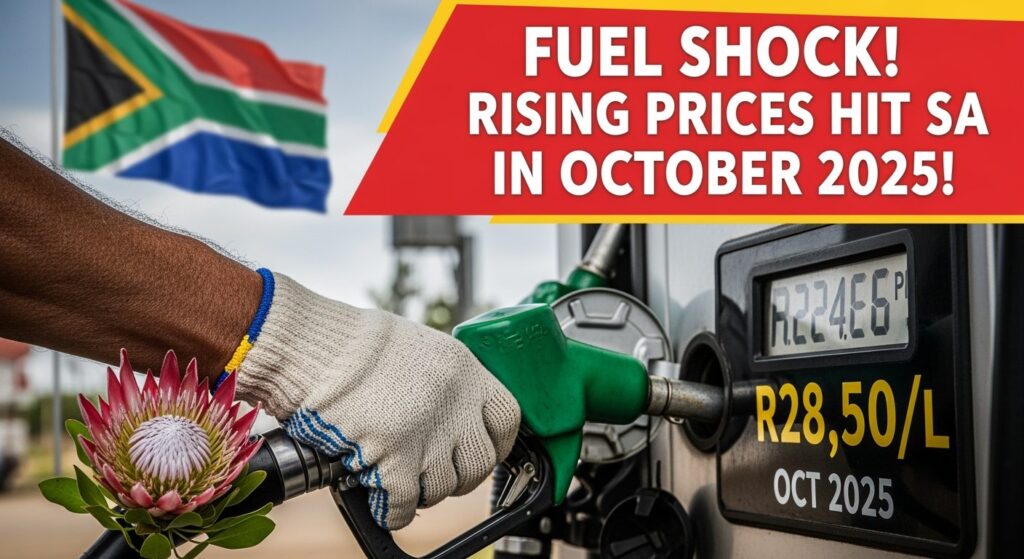South Africa petrol price increase: As we approach October 2025, South Africans are preparing for what could be one of the most significant fuel price hikes in recent years. I’ve been monitoring the situation closely, and the news isn’t looking good for motorists and businesses alike. The anticipated petrol price increase in South Africa is expected to put additional pressure on household budgets already stretched thin by rising living costs. You might be wondering how this will affect your daily commute or monthly budget planning. Well, the impact will likely be far-reaching, extending beyond just the cost of filling up your tank.

What’s Behind the October 2025 Fuel Price Increase?
The upcoming South Africa petrol price increase can be attributed to several global and local factors converging at once. International oil prices have been on an upward trajectory due to geopolitical tensions in major oil-producing regions and production cuts announced by OPEC+ countries. Additionally, the rand has been performing poorly against the US dollar, which directly impacts the price we pay at the pumps since oil is traded in dollars internationally.
Local levies and taxes also play a significant role in the final fuel price. The government has indicated that there might be adjustments to the fuel levy and Road Accident Fund contribution, further pushing prices upward. Climate-related policies aimed at reducing carbon emissions have introduced additional costs that are ultimately passed on to consumers. Have you noticed how these international factors always seem to affect our local economy at the most inconvenient times?
Why This Increase Matters to All South Africans
The ripple effects of the South Africa petrol price increase will extend far beyond the transportation sector. When fuel costs rise, so does the price of virtually everything else. Food prices will likely increase as farmers and distributors face higher transportation costs. The manufacturing sector will experience increased production costs, potentially leading to higher consumer goods prices or reduced profit margins for businesses already struggling in a challenging economic environment.
For the average South African, this means tighter household budgets and potentially difficult choices about spending priorities. Those who commute long distances to work will be particularly hard hit, with some potentially spending an additional several hundred rand per month just on fuel. Public transportation costs may also rise in response, affecting those who don’t own vehicles but rely on taxis and buses for their daily commute.
When Will We Feel the Full Impact?
The October 2025 petrol price increase is expected to take effect at midnight on the first Wednesday of the month, as is standard practice in South Africa. However, the economic impact won’t be immediate but rather gradual as businesses adjust their pricing strategies. By mid-October, you’ll likely notice price increases across various sectors, from retail to services. The holiday season that follows might be particularly expensive as businesses try to recoup their increased operational costs during this high-spending period.
Economic analysts predict that it might take three to six months for the economy to fully absorb and adjust to the higher fuel costs. This means we could be feeling the effects well into 2026, especially if international oil prices continue their upward trend or if the rand fails to strengthen against major currencies. The Central Bank might also respond with interest rate adjustments if inflation rises significantly as a result.
How Can You Prepare for Higher Fuel Costs?
- Review your monthly budget to identify areas where you can cut back
- Consider carpooling arrangements for regular commutes
- Investigate public transportation options where feasible
- Plan your trips efficiently to minimize unnecessary driving
Being proactive about your fuel consumption can significantly reduce the impact of the price increase on your finances. Simple changes like combining errands into single trips, maintaining proper tire pressure, and removing unnecessary weight from your vehicle can improve fuel efficiency. Some employers are also becoming more flexible with remote work arrangements, which could be a timely conversation to have with your manager if your job allows for it.
Real-World Impact: A Family’s Perspective
The Naidoo family from Johannesburg exemplifies how the fuel price increase will affect ordinary South Africans. With two working parents commuting a combined 80km daily and children involved in various extracurricular activities, they estimate their monthly fuel bill will increase by approximately R800. “We’re already looking at our budget to see where we can cut back,” says Mrs. Naidoo. “We’re considering carpooling with neighbors for school runs and possibly reducing some of the children’s activities that require driving across town.” Their story reflects the difficult choices many families will face as they adjust to the new economic reality brought about by the South Africa petrol price increase.
I believe that while these challenging times require adaptation, South Africans have repeatedly demonstrated resilience in the face of economic pressures. By planning ahead and making strategic adjustments to your consumption patterns, you can mitigate some of the impacts of this fuel price hike. What steps will you take to prepare for the October increase?




